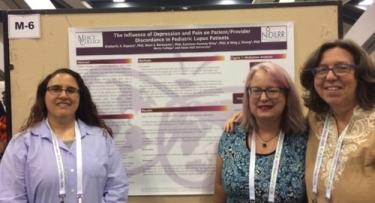Mercy Faculty Present Findings on Adolescent Lupus at International Conference

Photo taken prior to COVID-19
In November 2020, three Mercy faculty members were invited to present their findings on adolescent lupus at an annual meeting of the American College of Rheumatology. More than 16,000 attendees from 111 countries attended the virtual conference, which included Anthony Fauci among the presenters.
Kim Rapoza, Ph.D., associate professor of Psychology and Director of the Ronald E. McNair Scholars Program, Kathy Kenney-Riley, Ed.D., associate professor of Nursing, and Shari Salzhauer Berkowitz, Ph.D., associate professor of Communication Disorders, each gave an illuminating talk in a conference section called “Tools to Improve Quality of Life of Teens with Lupus.”
Rapoza addressed variables that affect a teen’s ability to function in school, work and social situations. “Our study found a correlation between the amount of depression, problems with peers, or perceptions of pain a teen was experiencing and a decline in their ability to thrive in key areas of their lives,” she said.
Kenney-Riley spoke about the disconnect that can sometimes arise between patients and their caregivers. “In talking about how well a teen with lupus might be doing, the provider may have one perception and the patient another. It all comes down to communication,” she said.
Berkowitz provided simple ways to improve the quality of life for adolescents with lupus by engaging outside resources. “Many practitioners are unaware of how much they can help their lupus patients by suggesting something as simple as an elevator pass or a doctor’s note for permission to rest during the day. Our aim was to encourage looking outside the box to help patients do better.”
The talks garnered a positive response from participants who, according to Berkowitz, “are not used to thinking about adolescent lupus beyond the medical model. We don’t think enough about referrals or asking schools to provide services. Our goal is to help these kids who are just trying to be kids.”
Mercy’s multi-disciplinary presence at the conference was supported by a Mercy College grant from the National Institute on Disability, Independent Living and Rehabilitation Research, now in its third year. Rapoza, Kenney-Riley and Berkowitz recently collaborated on a paper published in Health Psychology titled “Understanding patient-provider discordance in adolescents with lupus: The role of pain and antidepressant medication use.”
